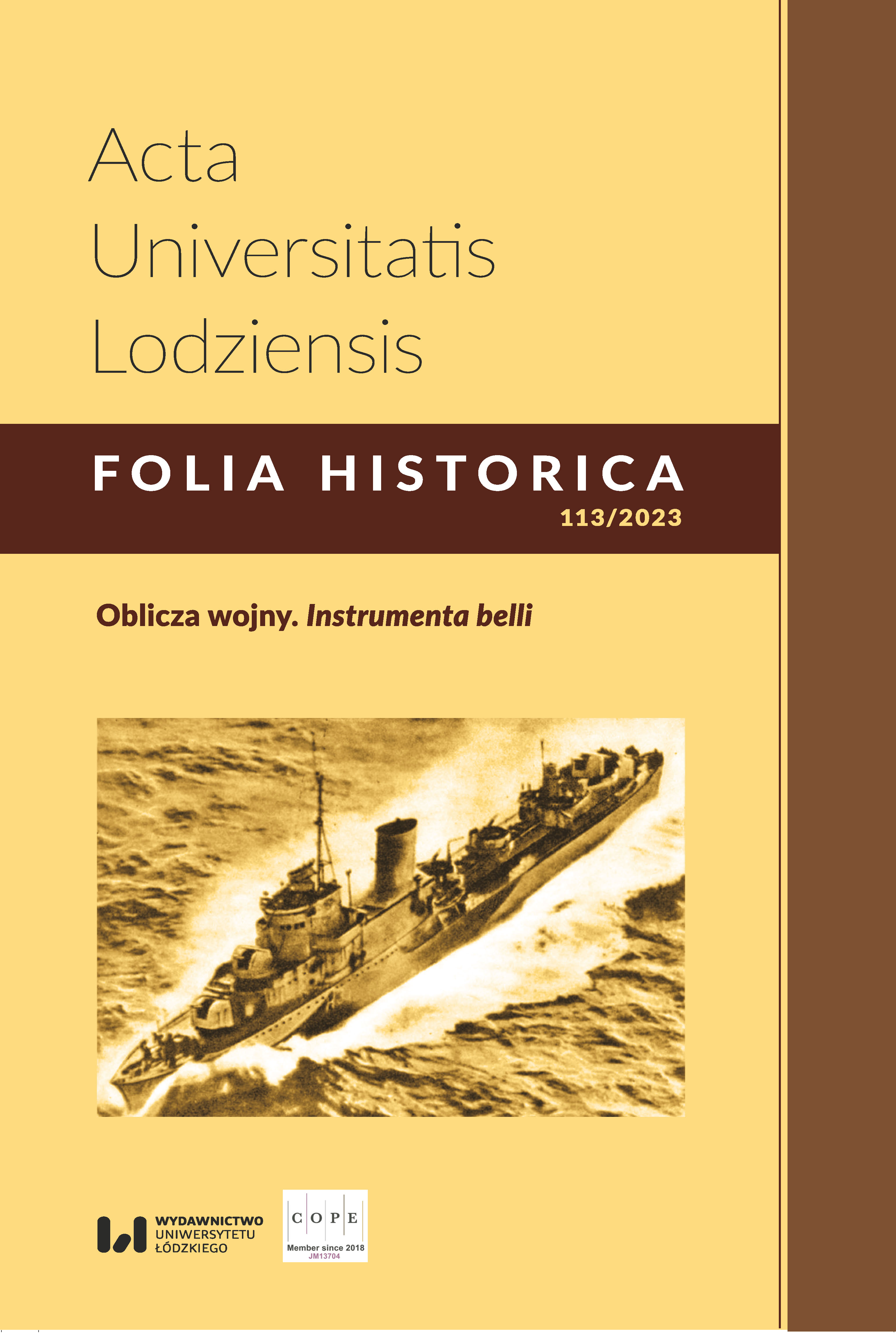Wine – the Lethal Drink of Ancient War in Frontinus’ Text
DOI:
https://doi.org/10.18778/0208-6050.113.02Keywords:
Frontinus, tricks of war, wine, mandrakeAbstract
The aim of the article is to present and analyze 3 passages of the work entitled War Tricks by Iulius Sextus Frontinus, in which wine appears as a tool of war. Wine, the drink well known to the ancients, which inflamed the senses and the body, relaxed and was a valuable medicine with warming properties, could also become a lethal weapon. When it was drunk in a form diluted with water or with an admixture of mandrake (especially in larger amounts), it weakened concentration, lulled vigilance, and could even lead to death directly. Weakening the opponent’s vigilance, intoxicated with the soothing alcoholic beverage, made it possible to tip the tide of victory in a relatively easy way. Thus, a moment of forgetfulness or an illusory occasion to celebrate, turned out to be a clever trap from which there was often no escape.
Downloads
References
Frontyn, Podstępy wojenne, przekł. B. Burliga, Wrocław 2016.
Google Scholar
Hezjod, Narodziny bogów, Tarcza, Prace i dni, przekł. J. Łanowski, Warszawa 1999.
Google Scholar
Homer, Odyseja, przekł. R. R. Chodkowski, Lublin 2020.
Google Scholar
Pliniusz, Historia naturalna, przekł. I. i T. Zawadzcy, Wrocław 2004.
Google Scholar
Plutarch, Żywoty sławnych mężów, przekł. M. Brożek, Wrocław 1953.
Google Scholar
Salustiusz, Sprzysiężenie Katyliny. Wojna z Jugurtą, przekł. K. Kumaniecki, Wrocław 2006.
Google Scholar
Tacyt, Dzieła, t. I–II, przekł. i wstęp S. Hammer, Warszawa 2004.
Google Scholar
Teofrast, Przyczyny powstawania i rozwoju roślin. Fizjologia roślin, przekł. H. Wójtowicz, Lublin 2002.
Google Scholar
Burliga B., Dziedzictwo Odysa I, [w:] Frontyn, Podstępy wojenne, przekł. B. Burliga, Wrocław 2016, s. 40–43.
Google Scholar
Burliga B., Imperium w tekście, tekst o imperium, [w:] Frontyn, Podstępy wojenne,przekł. B. Burliga, Wrocław 2016, s. 21–36.
Google Scholar
Członkowska-Naumiuk M., Sposobem lub podstępem. O fortelach wojennych starożytnych Greków, „Mówią Wieki: magazyn historyczny” 2018, nr 11, s. 53–56.
Google Scholar
Estreicher S. K., The Beginning of Wine and Viticulture, „Physical Status Solidi. C: Current Topics in Solid State Physics” 2017, vol. XIX, no. 7. https://doi.org/10.1002/pssc.201700008
Google Scholar
DOI: https://doi.org/10.1002/pssc.201700008
Everett N., The Alphabet of Galen: Pharmacy from Antiquity to the Middle Ages. A Critical Commentary of the Latin Text with English Translations and Commentary, Toronto 2012.
Google Scholar
Faszcza M. N., Pijany jak żołnierz? Rozważania o źródłach pewnego rzymskiego stereotypu, [w:] Alkohol w wojsku i na wojnie. Z dziejów wojskowości polskiej i powszechnej, red. A. Niewiński, Oświęcim 2018, s. 7–25.
Google Scholar
Gallia A. B., Frontinus, Sextus Iulius, [w:] The Encyclopedia of Ancient History, eds R. S. Bagnall, K. Brodersen, C. B. Champion, A. Erskine, S. R. Huebner, 1st ed., Malden 2012. https://doi.org/10.1002/9781444338386.wbeah21149
Google Scholar
DOI: https://doi.org/10.1002/9781444338386.wbeah21149
Graf M., Cieliczko M., Filologia wina – prolegomena, [w:] Język tożsamości. Język. Religia. Tożsamość XI, red. G. Cyran, E. Skorupska-Raczyńska, Gorzów Wielkopolski 2015, s. 21–38.
Google Scholar
Junkelmann M., Panis Militaris: Die Ernährung des römischen Soldaten oder der Grundstoff der Macht, Mainz 1997.
Google Scholar
Kucz A., Hermeneutyka wina, [w:] Szkice o antyku, t. III (Hermeneutyka wina), red. A. Kucz, P. Matusiak, Katowice 2017, s. 7–12.
Google Scholar
Kucz A., O perswazyjnej funkcji wina w narracjach biblijnych i mitologicznych, „Colloquia Litteraria” 2020, t. XXIX, nr 2, s. 85–96. https://doi.org/10.21697/cl.2020.29.2.4
Google Scholar
DOI: https://doi.org/10.21697/cl.2020.29.2.4
Lampkowska P., Kilka słów o antidotach stosowanych w starożytności, „Studia Europaea Gnesnensia” 2011, nr 3, s. 211–226.
Google Scholar
Liryka starożytnej Grecji, oprac. J. Danielewicz, Warszawa 2001.
Google Scholar
Myśliwiec R., Uprawa winorośli, Kraków 2013.
Google Scholar
Narloch K., Puchar cięższy od miecza. Alkohol a dyscyplina w armii późnego cesarstwa, [w:] Alkohol w wojsku i na wojnie. Z dziejów wojskowości polskiej i powszechnej, red. A. Niewiński, Oświęcim 2018, s. 26–41.
Google Scholar
Nikolova P., Stoyanov Z., Doncheva D., Trendafilova S., Wine as Medicine in Ancient Times, „Scripta Scientifica Pharmaceutica” 2018, vol. V, no. 2, s. 14–21. https://doi.org/10.14748/ssp.v5i2.5610
Google Scholar
DOI: https://doi.org/10.14748/ssp.v5i2.5610
Ogórka-Tabiś A., Wina świata antycznego – dziedzictwo kulturowe dzisiaj, [w:] Szkice o antyku, t. III (Hermeneutyka wina), red. A. Kucz, P. Matusiak, Katowice 2017, s. 123–134.
Google Scholar
Oxford Classical Dictionary, eds S. Hornblower, A. Spawforth, E. Eidinow, 4th ed., Oxford 2012.
Google Scholar
Roth J.P., The Logistics of the Roman Army at War (264 B.C. – A.D. 235), Leiden 1999. https://doi.org/10.1163/9789004236325
Google Scholar
DOI: https://doi.org/10.1163/9789004236325
Rybowska J., Sowa J., Kult Dionizosa jako boga wina, „Collectanea Philologica” 1995, nr 1, s. 163–174.
Google Scholar
Toussaint-Samat M., Historia naturalna i moralna jedzenia, przekł. A. B. Matusiak, M. Ochab, Warszawa 2002.
Google Scholar
Waniakowa J., Mandragora and Belladonna – the Names of Two Magic Plants, „Studia Linguistica Universitatis Iagellonicae Cracoviensis” 2007, nr 124, s. 161–173.
Google Scholar
Downloads
Published
How to Cite
Issue
Section
License

This work is licensed under a Creative Commons Attribution-NonCommercial-NoDerivatives 4.0 International License.











